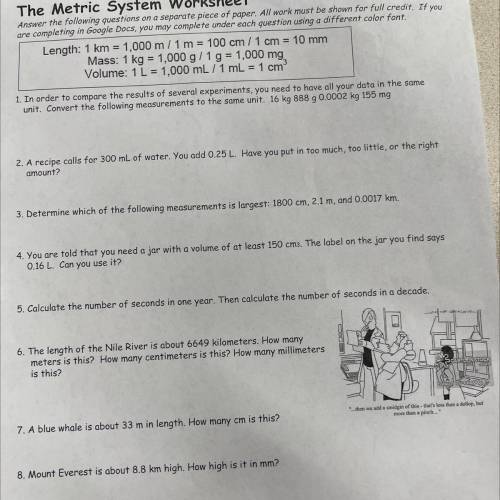Length: 1 km = 1,000 m / 1 m = 100 cm /1 cm = 10 mm
Mass: 1 kg = 1,000 g/1g = 1,000 mg,
Volu...

Chemistry, 08.09.2021 20:20 comaslaz21
Length: 1 km = 1,000 m / 1 m = 100 cm /1 cm = 10 mm
Mass: 1 kg = 1,000 g/1g = 1,000 mg,
Volume: 1 L = 1,000 mL/1 mL = 1 cm
3
1. In order to compare the results of several experiments, you need to have all your data in the same
unit. Convert the following measurements to the same unit. 16 kg 888 g 0.0002 kg 155 mg


Answers: 1


Another question on Chemistry

Chemistry, 22.06.2019 03:30
Explain why pure hydrogen cyanide does not conduct electricity, but become a conductor when it is dissolved in water? (at room temp, pure hcn exists as a volatile liquid)
Answers: 1

Chemistry, 22.06.2019 04:30
Use the drop-down menus to answer each question. which runner finished the 100 m race in the least amount of time? which runner stopped running for a few seconds during the race? at what distance did anastasia overtake chloe in the race?
Answers: 1

Chemistry, 22.06.2019 07:00
What is the main purpose of patent attorneys? defend the company against legal claims manage financial investments invent new products protect rights to new products and processes
Answers: 1

Chemistry, 22.06.2019 13:00
What happens to the average kinetic energy of a gas when the particles of the gas collide against each other at a constant temperature and volume? explain your answer.
Answers: 3
You know the right answer?
Questions









Computers and Technology, 28.07.2019 03:50













